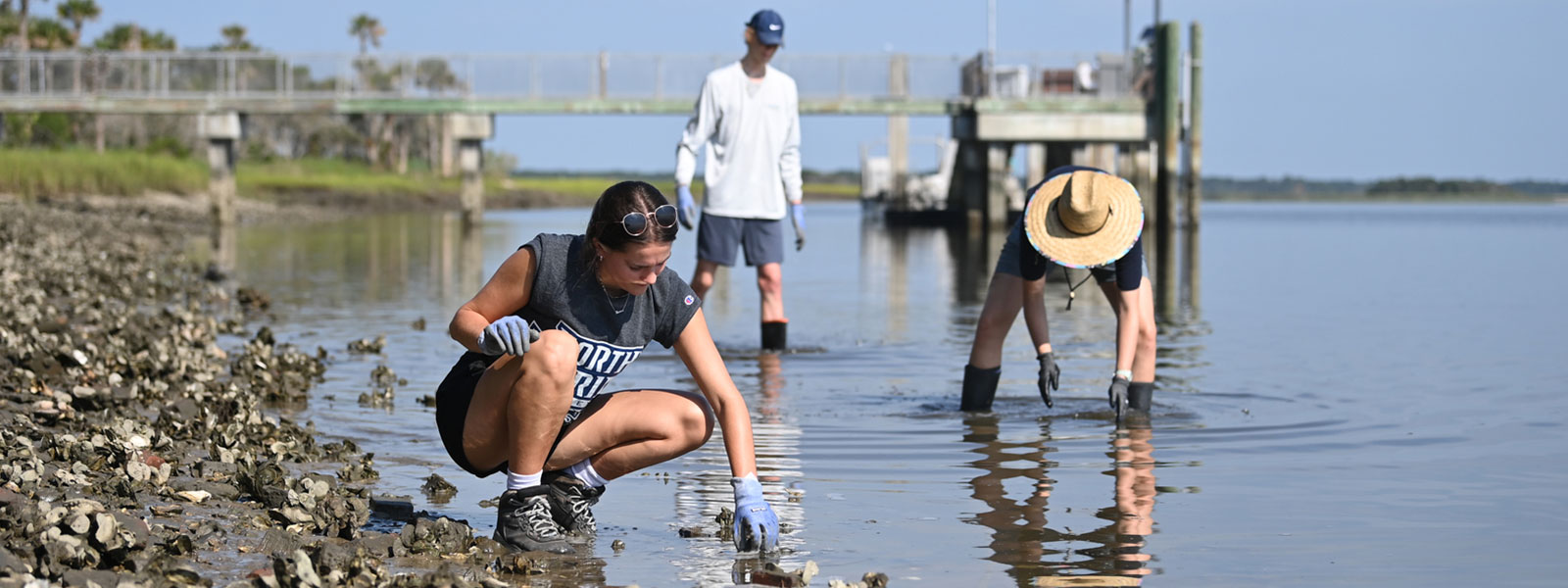A Blueprint for Guaranteed Hands-On Learning: A Model for Universities Everywhere
The University of North Florida (UNF) is pioneering a bold initiative to redefine experiential learning as a driver of student success, career readiness and social mobility. Dedicated to empowering students, UNF delivers more than degrees – It equips students with practical skills, confidence and the tools they need to build successful lives and meaningful careers.
Students need assurance that higher education will prepare them for high-paying, competitive jobs. Business leaders need confidence that graduates can contribute from Day 1 and adapt to evolving industries. Communities need to trust that universities are committed to preparing adaptable workforces to help attract and retain corporate headquarters. UNF’s already strong ties with local companies help many of its students gain hands-on experience before they graduate. Now, UNF is taking it a step further.
UNF has launched a transformative model that guarantees immersive experiential learning opportunities — such as internships, research and leadership experiences — for all undergraduates, starting with incoming students this fall. Unlike traditional optional models, UNF’s initiative breaks down financial and logistical barriers that have traditionally kept students from accessing such opportunities.
At UNF, the focus is clear – to enrich lives, strengthen communities and inspire impactful innovation, while ensuring every student has the tools they need to soar. By embedding career readiness and preparation skills into the curriculum, UNF aligns educational outcomes with workforce needs, ensuring students are equipped to excel in their professional journeys. This model helps students connect classroom learning to career goals early, building momentum and confidence throughout students’ academic paths.

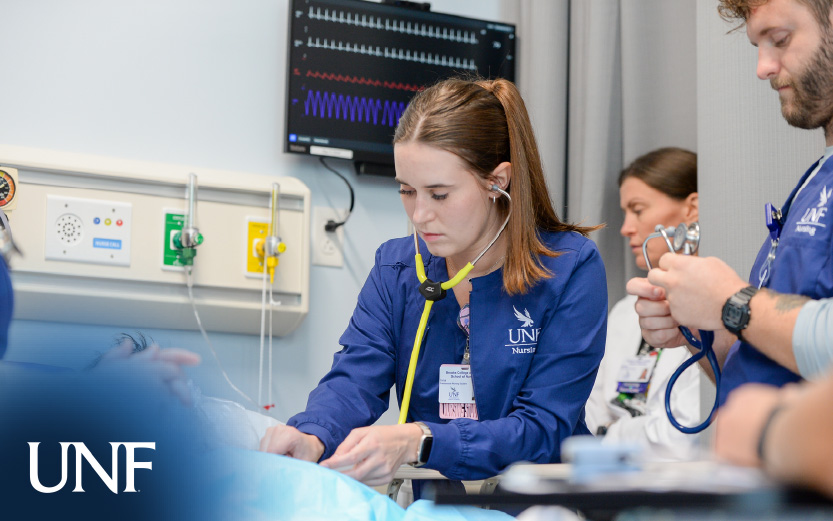
Advantage of Experiential Learning
Experiential learning is a best practice for applying theoretical knowledge to real-world settings. Rooted in the educational philosophies of John Dewey and David Kolb, hands-on learning is fundamental to the college experience. As they rightly posited, students immersed in active, hands-on experiences learn more effectively through engagement and reflection. Over time, experiential learning has evolved to include a range of activities, including internships, community-based projects, research opportunities and global learning experiences (Kuh et al., 2010). While traditional learning models can succeed in preparing students for what comes immediately after graduation, the core of Dewey and Kolb’s argument was that learning by doing transforms students in holistic, lasting ways.
Research shows that experiential learning enhances professional readiness beyond classroom learning, particularly in the skillsets employers seek. According to 90% of employers surveyed by EAB, 'soft skills' like critical thinking, leadership and communication are more important than technical skills in their hiring decisions. However, almost the same percentage of executives report difficulty finding candidates with these skills, and less than 40% of students feel confident that they will graduate with the necessary skills and knowledge to succeed in the workplace. In a 2023 online survey of 1,010 employers, 80% emphasized the importance of college graduates possessing skills, experiences and dispositions that foster flexibility, breadth of ability and depth of learning (Finley, 2023).
Additionally, employers value graduates who have experience working in interdisciplinary teams and tackling real-life problems. However, employers believe that educational institutions are not adequately preparing students for the workforce, particularly in communication, critical thinking and complex problem-solving — areas that 75% of employers consider very important.
In today's fast-changing job market, employers value practical experience and skills more than just theoretical knowledge. A survey by the National Association of Colleges and Employers (NACE), conducted by Gray (2023), revealed that 85% of employers prefer internships as their top method for recruiting future employees from universities, compared to career fairs and on-campus visits. A NACE study (VanDerziel, 2023) found that 75.5% of paid interns who accepted a position with the same employer were still employed there a year later, compared with just 51.5% who did not take part in an internship. Additionally, students who complete paid internships received twice as many job offers as students with no internship experience and received a higher first-year salary. Other research suggests that experiential learning opportunities contribute to social capital, that is, the strength of one’s social network and community. Social capital, in turn, increases potential employers’ ability to identify talent more quickly and trust the strength of their hiring decisions when hiring recent graduates.
The Access Problem
Access to experiential learning often hinges on two critical barriers: timing and cost. For many students, waiting until their third or fourth year to engage in career-related experiences is too late to build the momentum and social capital necessary for meaningful career preparation.
Researchers Milstein and French advocate for introducing students to career readiness and competency-based experiential learning earlier — in the first and second years of college. Early exposure ensures students are well-prepared and confident when engaging in higher-level work-integrated learning experiences, such as internships, fieldwork and practicums. By embedding experiential learning early, universities can set students on a trajectory of continuous growth and readiness.
Additionally, students often face financial and time burdens associated with internships and other hands-on opportunities, especially if students are unpaid for their time or must miss part-time work to participate.
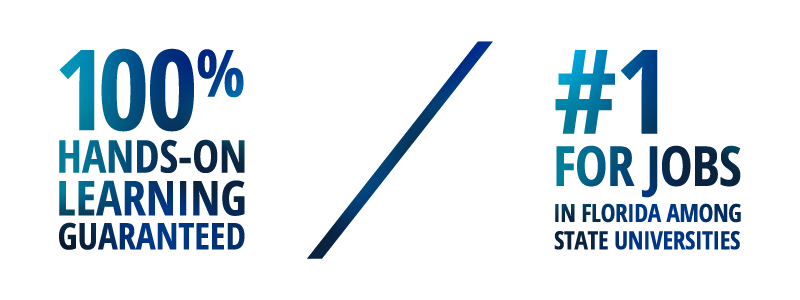
UNF's Experiential Learning Initiative
When she was still in high school, Alexanderia Crotts had an interest in the supply chain. UNF was the perfect place for her to study, considering its Transportation and Logistics Flagship Program is among the best in the nation, in part because of its partnerships with industry powerhouses in a city known as "America's Logistics Center." Crotts landed her first internship with Magellan Transport Logistics her freshmen year.
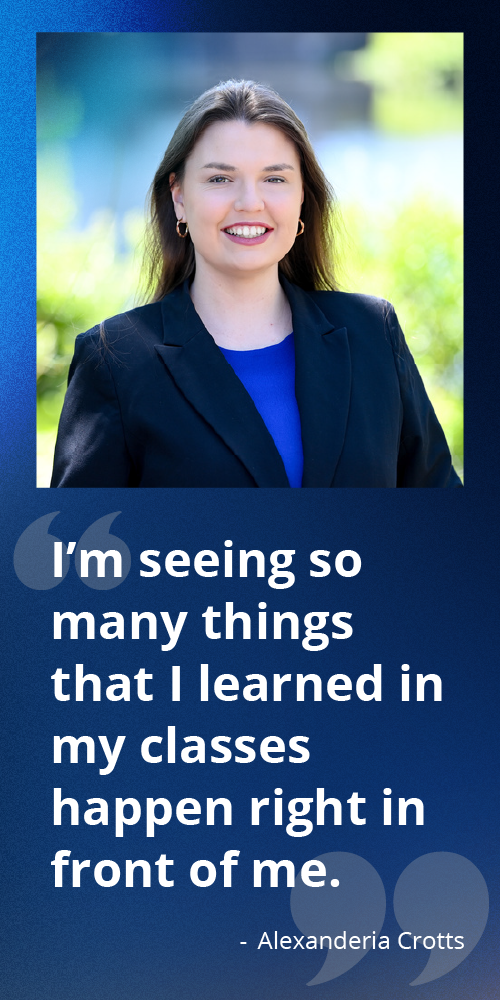 By the time she graduated last year, Crotts had completed four additional internships with the U.S. Environmental Protection Agency’s SmartWay program, Crowley Maritime, Southeastern Grocers and Bacardi. While at Bacardi, where she served as a production planning optimization intern, she was able to connect coursework to real-world experiences.
By the time she graduated last year, Crotts had completed four additional internships with the U.S. Environmental Protection Agency’s SmartWay program, Crowley Maritime, Southeastern Grocers and Bacardi. While at Bacardi, where she served as a production planning optimization intern, she was able to connect coursework to real-world experiences.
“I am able to see raw goods come together and make a finished product,” said Crotts. “I’m seeing so many things that I learned in my classes happen right in front of me.”
Currently, 85% of UNF students report having participated in at least one experiential learning experience. Beginning this fall, UNF will guarantee such experiences to all incoming students, integrating incoming students into experiential learning from day one. Located in Jacksonville, Florida — ranked as the second hottest job market in the country and the No. 1 city in the U.S. for corporate relocations — UNF is uniquely positioned to offer students unparalleled opportunities. It’s one of the reasons UNF is No. 1 for jobs in Florida.
UNF’s exceptional faculty and staff have connections with many of the more than 150 corporate, regional and divisional headquarters in the area. Those relationships lead to personal introductions and often visits during career fairs or similar events. For instance, a networking event led to an internship at the Mayo Clinic in Florida for Carleigh Eagle, which eventually earned her a position as a 3D engineer specializing in anatomical modeling with the hospital. Stephen Pond’s research with a UNF professor in digital signal processing helped lead to a high-demand AI internship. And Abraham Ovalle, an accounting and finance major, landed four career-defining internships before his graduation this spring. He leaves with a job in hand with a major accounting firm and with gratitude for those who helped him at UNF. “The time and energy that professors pour into students and organizations is what makes this University so special,” Ovalle said.
UNF students are offered a variety of opportunities, including paid internships, structured on-campus employment and zero-cost experiences to alleviate financial and time cost constraints for students. By offering a diverse menu of substantive, accessible experiential learning opportunities, UNF ensures all students can participate and benefit. Also, UNF is enhancing on-campus student employment by incorporating structured professional development. Students not only earn a paycheck but also gain leadership and decision-making skills. Additionally, the university is expanding paid off-campus internships to reduce conflicts with students' financial obligations. UNF is also training professional staff to assess, document and continuously improve how experiential learning opportunities are delivered. Perhaps most notably, academic units are actively seeking novel ways to embed learning by doing into their core curriculum, thereby placing experiential learning at the center of the student learning experience rather than at the periphery. This commitment to assessment and ongoing refinement ensures the initiative's effectiveness and sustainability.
To prepare university infrastructure for this rollout, our first step was to center experiential learning as a requirement, rather than optional, for all undergraduates. When merely an ‘option’ to learn experientially, the result is overutilization by students who already have the means to network and have family experience with college to guide them and, conversely, underutilization by first generation students. UNF’s experiential learning requirement ensures all students benefit from the access to social capital and enhanced professional development that experiential learning offers.
UNF’s Implementation Strategies
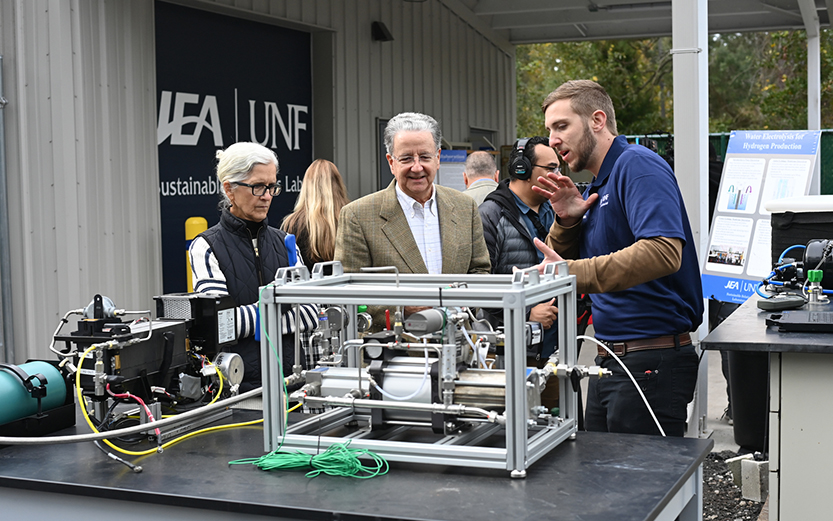 Implementing experiential learning effectively requires a multifaceted approach that engages various stakeholders and leverages institutional resources. Implementation begins with developing a comprehensive strategy, including the following infrastructure:
Implementing experiential learning effectively requires a multifaceted approach that engages various stakeholders and leverages institutional resources. Implementation begins with developing a comprehensive strategy, including the following infrastructure:
Partnerships with Industry
Building strong partnerships with industry leaders and employers is crucial for providing students with relevant and meaningful experiential learning opportunities. These partnerships facilitate internships, co-op programs and other work-based learning experiences that align with industry needs and standards. UNF’s experiential learning initiative connects students to professional networks and social capital essential for upward mobility. Pairing these learning experiences with UNF’s redesigned, student-centric proactive advising model, our students are set up for success from day one.
Faculty Involvement
Faculty play a critical role in embedding experiential learning into the curriculum. By including hands-on projects, case studies and real-world problem-solving activities into their courses, faculty play a primary role in enhancing student engagement and learning outcomes. Additionally, faculty often mentor students, guiding them in applying theoretical knowledge to practical, “real world” settings. At UNF, a critical step in our experiential learning initiative was to engage faculty and academic leaders. We not only explored ways to embed experiential learning more deeply into courses, but also to understand obstacles faculty face – both real and perceived. The result is that, yes, faculty and departments are creating new opportunities, but they are also enhancing existing experiential opportunities. Ultimately, this effort is creating a robust culture in which student learning thrives and faculty are leading the way.
Recognition and Incentives
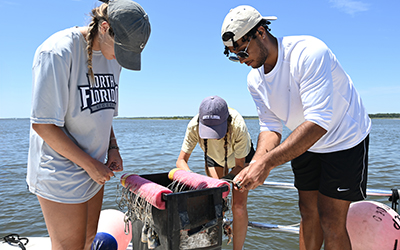 Recognizing and incentivizing experiential learning is important for motivating students and faculty to participate in these initiatives. At UNF, we offer career-quest badges, certificates and other forms of recognition to students who engage in experiential learning activities. Faculty are also encouraged to incorporate experiential learning into their courses through professional development opportunities and incentives. These opportunities provide multiple pathways for students to develop skills and competencies prior to internship-type experiences, enhancing their preparation and confidence.
Recognizing and incentivizing experiential learning is important for motivating students and faculty to participate in these initiatives. At UNF, we offer career-quest badges, certificates and other forms of recognition to students who engage in experiential learning activities. Faculty are also encouraged to incorporate experiential learning into their courses through professional development opportunities and incentives. These opportunities provide multiple pathways for students to develop skills and competencies prior to internship-type experiences, enhancing their preparation and confidence.
Comprehensive Support Services
Providing comprehensive support services is essential for the success of experiential learning initiatives. Career services, academic advising and mentorship programs help students navigate their experiential learning journeys and make informed decisions about their career paths. These services also assist students in preparing for and securing internships and other experiential learning opportunities. Employers value practical experience and skills more than just theoretical knowledge. At UNF, we are committed to helping students connect classroom learning to their career goals from day one by ensuring they gain real-world experience.
Conclusion
UNF’s experiential learning initiative redefines higher education’s value by aligning academic experiences with workforce readiness and fostering social mobility. By embedding hands-on learning into the undergraduate experience, UNF equips graduates to excel as leaders, thinkers and innovators in a rapidly changing world.
As an engine of talent, UNF is setting a national example for transformative education. This initiative invites collaboration from students, faculty, employers and community partners to build a brighter future for higher education. Together, we will ensure all students benefit from the promise of upward mobility and professional success.
Call to Action
To realize the full potential of experiential learning, we must collectively embrace this approach and integrate it into our educational practices. We encourage other institutions to follow UNF's lead and place experiential learning at the center of their undergraduate education. When higher education creates pathways that infuse career advancement, readiness and preparation skills into curricular offerings, we amplify the value of the college degree. By doing so, we ensure that all students have the opportunity to develop the skills and competencies needed to succeed in the workforce, contribute to their communities and achieve their professional goals.


